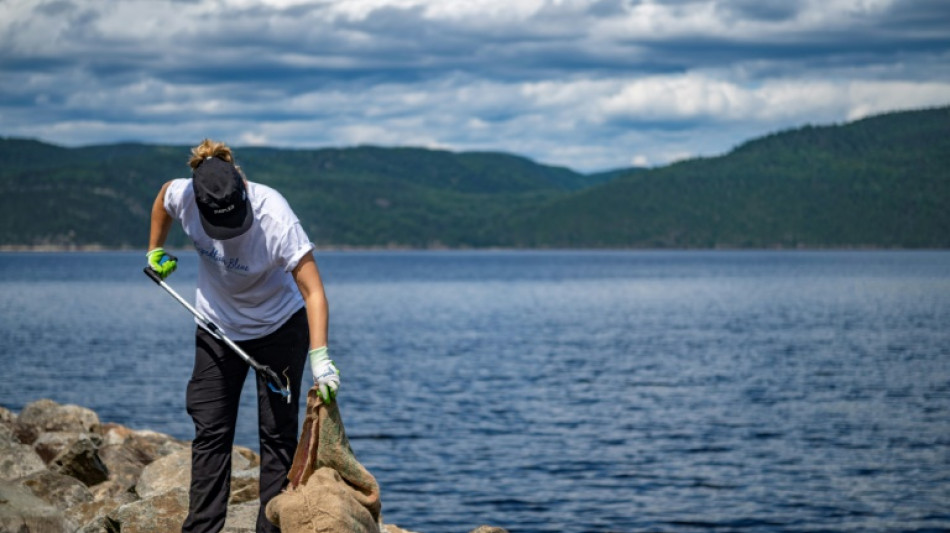
-
 Guinea's presidential candidates hold final rallies before Sunday's vote
Guinea's presidential candidates hold final rallies before Sunday's vote
-
Villa face Chelsea test as Premier League title race heats up

-
 Spurs extend domination of NBA-best Thunder
Spurs extend domination of NBA-best Thunder
-
Malaysia's Najib to face verdict in mega 1MDB graft trial

-
 King Charles calls for 'reconciliation' in Christmas speech
King Charles calls for 'reconciliation' in Christmas speech
-
Brazil's jailed ex-president Bolsonaro undergoes 'successful' surgery

-
 UK tech campaigner sues Trump administration over US sanctions
UK tech campaigner sues Trump administration over US sanctions
-
New Anglican leader says immigration debate dividing UK

-
 Russia says made 'proposal' to France over jailed researcher
Russia says made 'proposal' to France over jailed researcher
-
Bangladesh PM hopeful Rahman returns from exile ahead of polls

-
 Police suspect suicide bomber behind Nigeria's deadly mosque blast
Police suspect suicide bomber behind Nigeria's deadly mosque blast
-
AFCON organisers allowing fans in for free to fill empty stands: source

-
 Mali coach Saintfiet hits out at European clubs, FIFA over AFCON changes
Mali coach Saintfiet hits out at European clubs, FIFA over AFCON changes
-
Last Christians gather in ruins of Turkey's quake-hit Antakya

-
 Pope Leo condemns 'open wounds' of war in first Christmas homily
Pope Leo condemns 'open wounds' of war in first Christmas homily
-
Mogadishu votes in first local elections in decades under tight security

-
 'Starting anew': Indonesians in disaster-struck Sumatra hold Christmas mass
'Starting anew': Indonesians in disaster-struck Sumatra hold Christmas mass
-
Cambodian PM's wife attends funerals of soldiers killed in Thai border clashes

-
 Prime minister hopeful Tarique Rahman arrives in Bangladesh: party
Prime minister hopeful Tarique Rahman arrives in Bangladesh: party
-
Pacific archipelago Palau agrees to take migrants from US

-
 Pope Leo expected to call for peace during first Christmas blessing
Pope Leo expected to call for peace during first Christmas blessing
-
Australia opts for all-pace attack in fourth Ashes Test

-
 'We hold onto one another and keep fighting,' says wife of jailed Istanbul mayor
'We hold onto one another and keep fighting,' says wife of jailed Istanbul mayor
-
North Korea's Kim visits nuclear subs as Putin hails 'invincible' bond

-
 Trump takes Christmas Eve shot at 'radical left scum'
Trump takes Christmas Eve shot at 'radical left scum'
-
3 Factors That Affect the Cost of Dentures in San Antonio, TX

-
 Leo XIV celebrates first Christmas as pope
Leo XIV celebrates first Christmas as pope
-
Diallo and Mahrez strike at AFCON as Ivory Coast, Algeria win

-
 'At your service!' Nasry Asfura becomes Honduran president-elect
'At your service!' Nasry Asfura becomes Honduran president-elect
-
Trump-backed Nasry Asfura declared winner of Honduras presidency

-
 Diallo strikes to give AFCON holders Ivory Coast winning start
Diallo strikes to give AFCON holders Ivory Coast winning start
-
Spurs captain Romero facing increased ban after Liverpool red card

-
 Bolivian miners protest elimination of fuel subsidies
Bolivian miners protest elimination of fuel subsidies
-
A lack of respect? African football bows to pressure with AFCON change

-
 Trump says comedian Colbert should be 'put to sleep'
Trump says comedian Colbert should be 'put to sleep'
-
Mahrez leads Algeria to AFCON cruise against Sudan

-
 Southern California braces for devastating Christmas storm
Southern California braces for devastating Christmas storm
-
Amorim wants Man Utd players to cover 'irreplaceable' Fernandes

-
 First Bond game in a decade hit by two-month delay
First Bond game in a decade hit by two-month delay
-
Brazil's imprisoned Bolsonaro hospitalized ahead of surgery

-
 Serbia court drops case against ex-minister over train station disaster
Serbia court drops case against ex-minister over train station disaster
-
Investors watching for Santa rally in thin pre-Christmas trade

-
 David Sacks: Trump's AI power broker
David Sacks: Trump's AI power broker
-
Delap and Estevao in line for Chelsea return against Aston Villa

-
 Why metal prices are soaring to record highs
Why metal prices are soaring to record highs
-
Stocks tepid in thin pre-Christmas trade

-
 UN experts slam US blockade on Venezuela
UN experts slam US blockade on Venezuela
-
Bethlehem celebrates first festive Christmas since Gaza war

-
 Set-piece weakness costing Liverpool dear, says Slot
Set-piece weakness costing Liverpool dear, says Slot
-
Two police killed in explosion in Moscow


Scientists track plastic waste in pristine Canada marine park
Old tires, discarded cups, and cigarette butts litter the magnificent Saguenay Fjord, a marine protected area in eastern Canada that attracts belugas and other whales seeking respite.
Cliffs sculpted by glaciers flank the fjord that connects to the Saint Lawrence River, far from any major city. The marine sanctuary was granted protected status 26 years ago.
"It's one thing to legislate to make it a protected area, but then how do we maintain it?" said Canadian biologist Anne-Marie Asselin before diving in search of trash.
With her team from the Blue Organization, she navigates the brackish waters of the fjord to document pollution in the area.
The objective is twofold: to identify the most common waste to target the plastics that should be banned from sale, and to predict the banks most at risk of being polluted, based in particular on currents, to better target cleaning campaigns.
- Worrying trend -
By paddle board, on foot or freediving, Asselin and her crew collect all kinds of waste in the bay of the village of Petit-Saguenay.
Under a blazing hot sun, the group's Laurence Martel sorted the waste by more than 100 criteria, including by brand, to eventually seek to hold producers responsible for their products' entire lifecycle.
"The most popular find is the cigarette butt, it is omnipresent," Martel said.
She noted that a single cigarette butt can contaminate up to 500 liters of water due to the thousands of chemical compounds it contains.
In five years, the team's research has revealed a worrying trend: the concentration of plastic waste is increasing significantly closer to the Gulf of Saint Lawrence and the Atlantic, "suggesting a shift in waste from urban areas towards downstream parts of the river."
"Very often, the smallest plastics are the ones that pollute the most," Martel said.
- Ecosystem health -
Waste becomes microplastics as it disintegrates. Most often invisible to the naked eye, these particles are made of polymers and other toxic compounds that vary from five millimeters to one thousandth of a millimeter.
They are found throughout the food chain of marine life, particularly invertebrates.
The Blue Organization fishes and analyzes these "sentinel species" -- considered gauges of the health of their environment -- during each cleanup operation.
"If your mussels and your invertebrates are starting to suffer, that could be an indicator that the health of the ecosystem is also declining," said Miguel Felismino, of McGill University in Montreal.
Seated on a catamaran, Felismino measured, photographed and arranged the mussel specimens, which he will also analyze in a laboratory to study the effects of microplastics.
Using a homemade pump and a few pipes placed at the front of the boat, he also collected surface water and sediment from the seabed for his research
- Behavioral changes -
The Blue Organization wants to produce a complete picture of the plastic lifecycle in protected areas such as the Saguenay-Saint Lawrence Marine Park.
But to protect these ecosystems, the solution is "also to trigger behavioral changes" in people, said the biologist Asselin, who called on artists to "raise awareness" of the situation.
This could involve making music from natural sounds or creating a "literary translation" of scientific research, Asselin said.
"With climate change, the soundscapes associated with certain territories are set to evolve," said one such artist, Emilie Danylewick, before plunging her hydrophone into the water to record the sounds.
Danylewick said her work is a "way to preserve the current soundscape memory of the territory."
Y.Aukaiv--AMWN



